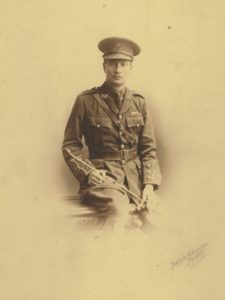Charles Wilmot Evans was born on 28 March 1891 in the Green House Tettenhall. He was the only son of Henry Evans, a Wolverhampton bank manager and Florence Evans (nee Marten). Wilmot, as he was known, had both an elder sister, Molly and a younger sister, Fiffy.

Captain C Wilmot Evans in Jersey 1915
We have an extensive archive of his effects, mainly kept by Molly and a large number of photos, letters and postcards only some of which appear on this site.
He was educated at Shrewsbury School, where he clearly had a keen interest in a number of sports. On leaving he joined the army and trained as an officer getting his commission in the South Staffordshire Regiment as a second lieutenant in July 1910. His military career before the First World War took him to Gibraltar and South Africa. In 1914 his regiment formed part of the British Expeditionary Forces in France where he landed in October 1914, fresh back from South Africa. He saw his first action on 21 Oct at Strooboomhoek (first Battle of Ypres), where the division sustained heavy casualties. A condolence letter sent by Wilmot to Drummer Wheeler has been published, not least indicating the high level of casualties amongst the officers.
On 16 May 1915 Wilmot was fairly seriously wounded, hosptalized and forced to return to England. He received a Military Cross (probably) for this action and was promoted to Captain.
A collection of his letters is available on this website to his good friend and neighbour, Noel Downing‘s sister Mary. Also five letters survive, that were written to Uncle Teddy and Aunt Netty whilst back in Hagley in June 1915 responding to his award of the MC.
By the autumn of 1915 he was recuperating with fellow officers in Jersey before rejoining his regiment early in 1916. The big push came along the whole of the British lines on 1 July 1916.
The South Staffordshires were part of the 46th division earmarked to attack the German fortifications at Gommecourt to the north of the Somme. This was no more than a diversionary tactic and evidently had little chance of success. Testimony exists that Wilmot was one of the few to make it to the German trenches, where in face to face fighting he was shot in the stomach. He was left for dead as the retreat was sounded and was recorded as missing in action – one of 60,000 British soldiers to fall as casualties along the front on that day.
An account of the action and Molly’s attempt to find out what happened has recently been published in a book by Alan MacDonald “Lack of Offensive Spirit?” Iona 2008.